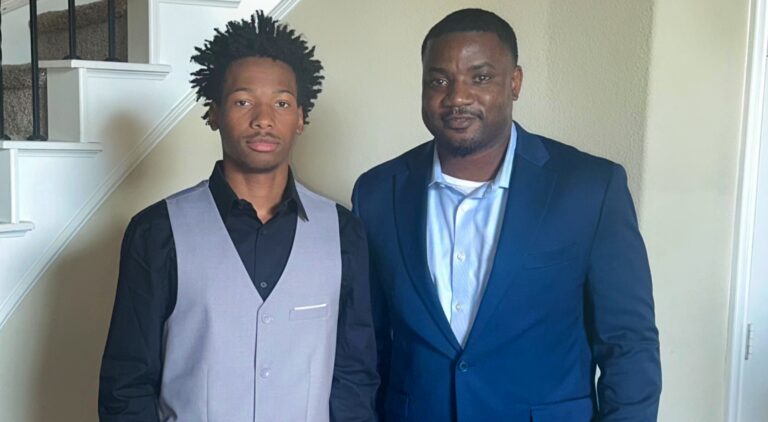The murder case against 17-year-old Karmelo Anthony has taken another dramatic turn, capturing public attention not only for the crime itself but also for the growing financial controversy surrounding his defense. What began as a tragedy at a high school track meet has now spiraled into a heated debate over fundraising, legal costs, and the pursuit of justice for both families involved.

Indictment and Court-Appointed Counsel
In a recent Facebook post, Karmelo’s father, Drew Anthony, confirmed that his son has been officially indicted by a Collin County grand jury on one count of first-degree murder. The indictment stems from the fatal stabbing of Austin Metcalf during a track event in Frisco, Texas.
Drew also revealed that Karmelo has requested a court-appointed lawyer, citing financial hardship. This revelation shocked many observers, since the family had already raised more than half a million dollars through public donations and is now aiming for a new fundraising goal of $1.4 million. The decision to rely on a public defender instead of private counsel has raised eyebrows and sparked widespread speculation about how the family has been managing the money.
Where Did the Money Go?
Critics online have been quick to question what happened to the $500,000 that supporters contributed through crowdfunding. Some have accused the family of mismanaging or misallocating funds. Drew Anthony pushed back against these claims, explaining that the donations have gone toward urgent and essential expenses beyond just legal fees.
According to the family, the funds have been used to cover trauma counseling for Karmelo and other family members, relocation expenses after receiving threats, transportation to and from court appearances, and basic living costs that became overwhelming after the incident. Drew emphasized that the donations have not been wasted but instead allowed the family to survive under extraordinary pressure.

Release and Legal Limits
Karmelo was released from the Collin County jail after his bond was reduced, but the case remains far from over. Prosecutors have clarified that while he is charged with first-degree murder, he will not face the death penalty because he was 17 at the time of the stabbing. Collin County District Attorney Greg Willis explained in an interview with Fox News Digital that Supreme Court rulings prevent minors from being sentenced to death or even life without parole.
This legal technicality has added fuel to the debate, especially among those who believe the crime warrants the harshest possible punishment. For Austin Metcalf’s family, the legal restrictions are a bitter pill to swallow.
The Victim’s Family Responds
Austin’s father, Jeff Metcalf, shared his frustration in an interview with TMZ. He stated that he would have supported the death penalty if Karmelo had been 18 when the crime occurred. “It’s the law, unfortunately,” he admitted, underscoring the reality that timing changed everything about the case’s potential outcome.
The Metcalf family continues to grieve while also following the developments closely, determined to see justice served. For them, the focus remains on remembering Austin’s life and pushing through the painful process of court proceedings.
The Growing Toll
As the case moves toward trial, both families find themselves battling not only the justice system but also the weight of public scrutiny. For the Anthonys, the emotional and financial toll continues to mount. Drew Anthony has described the ordeal as a relentless storm—one that drains resources, fuels judgment from strangers online, and leaves little space for healing.
The family insists that their plea for donations is not exploitation but a lifeline to help them keep fighting. With legal fees, therapy, relocation costs, and daily living expenses piling up, they argue that their needs extend well beyond a courtroom defense.
A Community Divided
The case has divided the public. Supporters of the Anthony family believe the donations are being used appropriately, highlighting the reality that navigating a murder charge involves far more than hiring a lawyer. Critics, however, remain skeptical, demanding transparency and questioning why a family that raised so much money now claims financial hardship.
At the same time, Austin Metcalf’s supporters are calling for compassion and justice for the victim’s family, who lost their son in a violent and senseless act. For many, the debate over money distracts from the deeper tragedy—the life of a young man cut short.
What Comes Next
As the trial approaches, the spotlight on this case shows no signs of dimming. Legal experts suggest that the reliance on a court-appointed attorney could change the strategy for Karmelo’s defense. Meanwhile, both families must brace themselves for the long, grueling road ahead—one filled with emotional strain, unanswered questions, and continued public scrutiny.
For the Anthonys, the fight is about protecting their son and ensuring he receives a fair trial, regardless of public opinion. For the Metcalfs, it is about honoring Austin’s memory and pushing for accountability. In the middle lies a community torn apart by violence, grief, and the difficult realities of the justice system.





